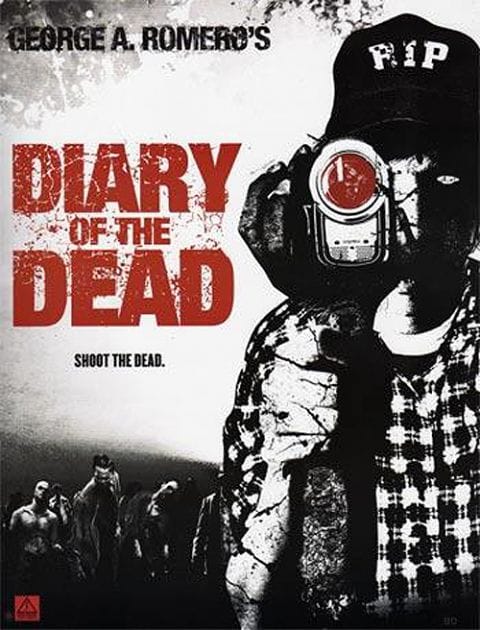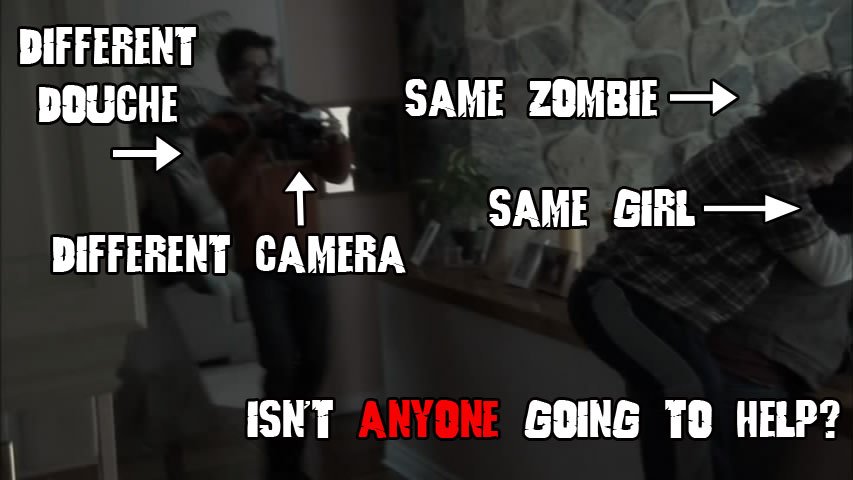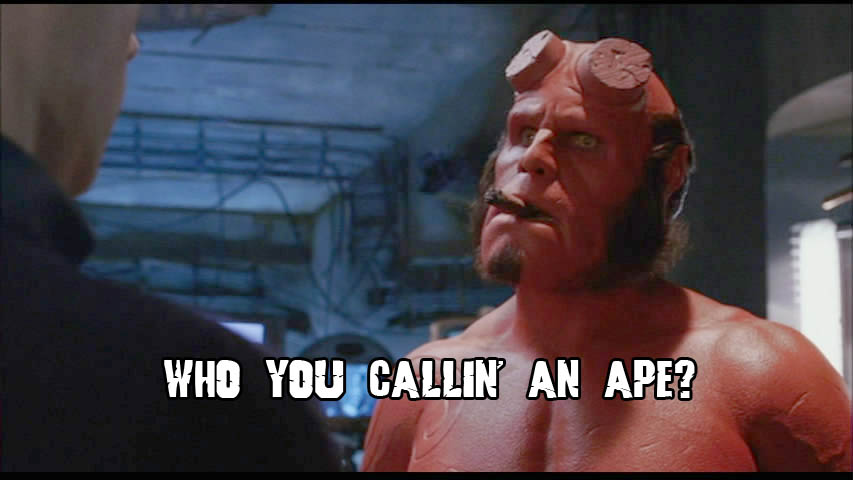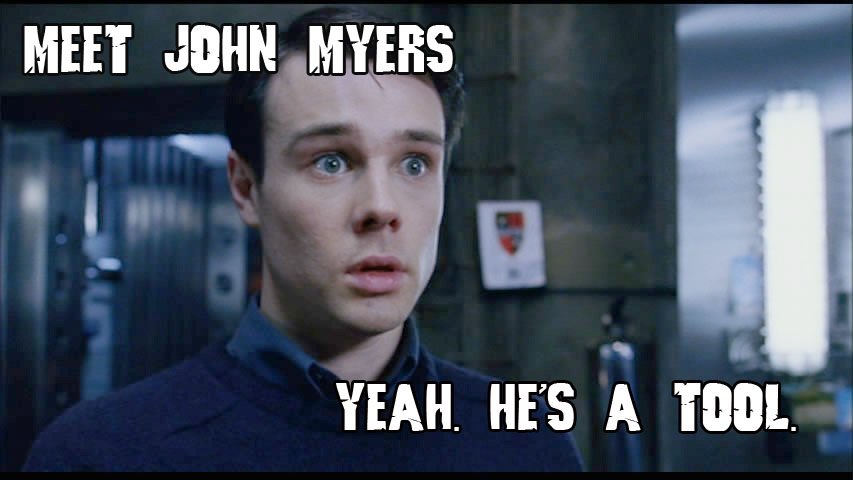
It would not be hyperbole to say that George Romero created the modern zombie movie genre. With his groundbreaking first film, Night of the Living Dead, George Romero created an idea whose light still flickers in our collective imaginations. The movie deals not only with reanimated flesh eating ghouls, but also with gender roles and racism. Not content to simply dream up an idea and turn it loose on the world, Romero refined and polished his vision in the original sequel, Dawn of the Dead, offering up a scathing condemnation of our American consumption society.
And most people think zombie films are about blood and brains.
Diary of the Dead is a low budget, return to roots project for George Romero. In this film he chronicles the beginning of a zombie apocalypse, similar in timing with the original "Night" film. The events have been brought up to date, taking place in a thoroughly modern world that includes hand held video cameras, blogging, and the internet. In Diary of the Dead Romero sets out to ask the question of how far has our society really come since 1968? For all of our technological advances, how different are we as a species?
Unfortunately, in three short paragraphs, I've managed to ask that question more eloquently than Romero does in the film itself. The biggest problem is that the film wears its low budget on its sleeves. The cinematography is okay, the story is simple but effective, but the script and the acting leave a lot to be desired.

The movie takes place in a first person perspective, similar to the Blair Witch Project or the more recent Cloverfield. Like those movies, the main character is some smarmy twat who, for whatever reason, won't put the camera down regardless of the circumstances. This usually isn't a big problem for me in these types of films, some suspension of disbelief is necessary in all films after all, but the execution of it in Diary left me cold. The characters are constantly reminding us that Jason, the main character, is still filming. They ask why but Jason never responds. In the first 12 minutes the fact that he is filming is directly referenced three times. This is the type of question best left to nitpicky audience members, not characters in the film. When a character blatantly asks this question, everyone watching the movie suddenly thinks "Yeah! Why is he still filming?" So much for suspension of disbelief.
Another example of this occurs in the opening moments of the film. A girl, whom I will now refer to as Exposition Jill, introduces herself, gives us some background about the zombie invasion, and then lets us know she's edited together the footage we're about to watch. Exposition Jill goes on to tell us about the guy filming the rest of the film. His name is Jason Creed. This guy is filming this documentary, "The Death of Death," so that we will know the truth. Hooray. Filmmaker cliché number one and we're less than five minutes in. Then, to top this little sequence off, Jill tells us she's added music to some of the footage. She's added music to scare us. I'm not paraphrasing. She says she deliberately added the music to scare us. To make us care about THE TRUTH (TM).


Come on, George. We're not idiots. No one was going to say, "Hey, if this is supposed to be a documentary, where did the music come from?" Most people would happily explain it away to themselves as someone found the footage and doctored it up. No clunky expositional character required. The type of nitpicky person you're trying to address with this explanation doesn't deserve to be recognized. If someone is nitpicky enough to ask that question, hopefully everyone else in the room would tell them to shut up and just watch the movie. Instead, by addressing this issue head-on, the movie comes off as pompous and self-serving. Sorry George, but recognizing and calling attention to a gaping hole in the way you've chosen to present your story does not excuse said gaping hole.
Ahem.
P.S. 15 Minutes in and someone just mentioned Jason is still filming again. Awesome. I'm going to stop counting now.
Okay, nitpicking aside, this isn't a bad movie. I definitely think the script could have used some tightening up, if only to avoid the issues listed above. The acting is on par for a low budget film, but no one is going to win any awards. The makeup zombie effects are fun and effective and Romero shows a real love for the genre he helped create. There's a few real creative zombie dispatchings that were a welcome addition to the standard issue brain splattering head shots. One zombie gets bashed over the head with hydrochloric acid and we watch him stumble around as his skull dissolves. Another zombie gets lobotomized with an IV stand. A deaf Amish dude impales his own head with a sickle to off both himself and the zombie attacking him from behind.
That's a new one on me.
And then, 26 minutes in, Douchey McTardathon's camera runs out of battery and he separates from the group to plug it in. Yeah.
Yeah.
Moments of brilliance and moments of ridiculousness. A very unbalanced experience.

So from here, more stuff happens. There's a fairly drawn out sequence with some paramilitary types that always seem to grace flicks in this genre. Some of what happens is pretty cool, some of it isn't. The film's message about our dependence on the media and technology is scathing in typical Romero fashion. The heavy handed commentary about our YouTube society, a society that would rather watch itself fall apart for entertainment value rather then lend a hand to help, will bludgeon you over the head like a sledgehammer. This is a stark contrast to the subtlety evident in Romero's earlier works. The points made are perfectly valid and thought provoking, but this is a case of a film suffering for its message.
Oh, and yes. Like always, in the end, we're the real monsters.
The Bottomline: The good outweighs the bad, but you'll want to turn your brain off to get the most out of the film. Not a good sign for a film trying to deliver a social commentary. If you like Romero and have been jonesing for a zombie fix in the post-Land of the Dead world, you're likely to enjoy it. Lord knows you'll never see a big budget, studio produced Romero flick again, so take what you can get I say.
Three stars.

The modern comic movie adaptation fan has clearly been spoiled by the excellent Iron Man from Marvel Studios and the Batman Begins franchise reboot from Warner. Back in 2004 when Hellboy hit the silver screen the best efforts we had seen so far were Spider-Man two years previous, X2: X-Men United, and Spider-Man 2 that very same summer. While there was precedent for good comic adaptions, Hellboy was by no means a sure fire hit.
You'll be glad Revolutionary Studios took a chance on this property. At first glace, a big, bright red demon smoking cigars and cracking wise doesn't look like a recipe for success. There was a real chance that, in the wrong hands, the artistic visual style of the comic books could seriously hamper any serious attempts to adapt the character for a mainstream audience. The studio was right to take on the still budding director Guillmero del Toro to work on the film. As a filmmaker, del Toro has never shied away from the fantastic. Years after Hellboy, he would come into his own with the visually impressive and thought provoking Pan's Labyrinth. At this time, del Toro still had something to prove.

By taking one look at Hellboy, you can really feel del Toro's visual style just beginning to take shape and pop off of the celluloid. His eagerness to embrace special effects, both practical and computer generated, does the realization of Mike Mignolia's Hellboy universe a great justice. Although del Toro is clearly just gaining his footing in this film, and he definitely feels reigned in by studio suits at some points, you never doubt his energy and enthusiasm for the material.
Enough pre-review swooning. Onto the film. Hellboy is a fun-filled, action-oriented experience. The special effects are all well done and the practical makeup effects used to bring the life the titular character are top notch. As good as the makeup is, Hellboy would be nothing without the actor beneath the latex, and Ron Perlman delivers in spades. His ability to act from beneath a full facial appliance is a true testament to this unsung Hollywood hero's abilities. Hellboy himself is a fun character, with a lot of personality. His bright red skin jumps off the screen, but his cigar chomping, wise cracking, bullish attitude is what makes him memorable.

Doug Jones does a wonderful job as the the man inside the Abe Sapien makeup, delivering a performance just this side of Andy Serkis. His voice acting by David Hyde Pierce is top notch. The necessary babe and love interest, provided by Selma Blair as the firestarter Liz Sherman, is suitable hot both literally and figurtively. John Hurt plays Hellboy's adopted father and doesn't miss a single sentimental beat. As far as acting goes, there isn't much here to complain about.

The script, on the other hand, is a bit lacking. The Lovecraftian themes are definitely welcome. More stories involving the elder gods and the chaotic hells they may bring upon the earth are needed in films. It's a story line not yet mined for all it's worth, so some credit for being original is definitely due. However, some of the scripting and dialogue is just clunky and overly expositional. Too much of Hellboy's world is explained to us rather than letting us experience it. The biggest sin the movie makes is the inclusion of the main human or "normal" character, John Myers. Rupert Evans does a commendable job with the material he's given, but it just isn't enough to stop the character from feeling like a studio note. It's almost imaginable that some studio suit somewhere couldn't justify letting del Toro make a movie about a bunch of freaks. The charatcer of John Myers is there to provide the audience with a "normal" character they can identify with, and so that the audience can be introduced to the world with a suitable anchor to reality. Basically, it feels like a big cop-out.

Luckily, despite some clunkiness, the movie is driven by a collection of imaginative, particularly nasty villains. The lead amongst them is Rasputin, as realized by Karel Roden. He and his mistress are suitable masterminds for the proceedings, but it's their company that's far more interesting. The walking, mechanical nightmare that is Karl Ruprecht Kroenen is a sight to behold, particularly with his Vader-like breathing aparatus removed. A cooler henchman hasn't been seen in cinema in many years. Sammael, the hound of resurrection, is a fun creature-creation, although the costume does look a bit rubbery in some scenes.
The plot of the film deals with Rasputin trying to bring about the end of the world by allowing the elder gods entry into our world. Hellboy himself is central to this plot, being the demon son of the ultimate evil. Having been raised by men to know the trials and tribulations of our world, he will be left with a choice. Will Hellboy fulfill his destiny and bring about the end times or will he rise above and fight for the salvation of mankind?
The Bottomline: Hellboy is a good comic movie, made in a time when good comic book movies were still a rarity. If you're willing to accept some cheese and a few pieces of clunky exposition, you are unlikely to be disappointed.
Four stars.